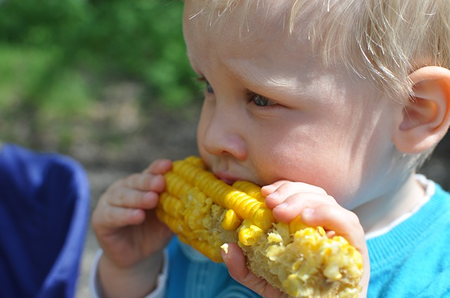We hear about vegetables' importance to health all the time, but many children and adolescents still don't eat even one serving a day. Some parents assume that eating vegetables is something kids pick up later in life.
Yet the Centers for Disease Control and Prevention report in a recent survey that only 13% of high school students say they eat at least 3 servings of vegetables per day.
Besides, researchers say, kids who skip vegetables miss out on health benefits that start to build early. It turns out that parents who serve vegetables in ways that they themselves enjoy are the most powerful influence on raising a vegetable-eater.
A review of 60 studies concluded that seeing their parents eat and enjoy vegetables was the most powerful influence in promoting vegetable consumption among kids.
That's a problem, since one study of vegetable consumption in young children found that only a quarter of parents ate more than one vegetable a day, a long way from the minimum of three to five servings recommended for adults.
Simply having fruit in the home may be all that's needed to encourage its consumption, at least for older children who can grab it for a snack on their own. Since vegetables often require some preparation, however, it may be important not only that they are brought home, but that they are served at meals or made ready for snacks.
How much should parents encourage or enforce vegetable consumption? Not all of the 60 studies in the review above addressed this issue, but of those that did, parental encouragement was linked with greater vegetable consumption in children ages six to eleven; parental pressure was generally not.
Among adolescents, parents' vegetable consumption remained an important influence but parental encouragement no longer surfaced as key to vegetable consumption.
Some experts on children's eating behavior suggest that parental pressure could be a negative influence on their children's vegetable consumption. They suggest that forcing vegetables or rewarding their consumption teaches children that these are not enjoyable foods.
Other researchers say that it may not always be parental pressure that causes kids to proclaim themselves vegetable haters; sometimes kids may become afraid of vegetables and other new foods on their own, leading parents to react out of fear trying to force vegetables.
Dislike of trying new foods, called "neophobia," is very common in children ages two to five but can continue for years and is linked with low vegetable consumption. Parents help kids gradually outgrow this fear by continuing to serve a variety of foods.
Studies show that parents often give up on a new food after three to five tries; experts recommend a minimum of 8 to 15 tries, and kids may still need to see and then try a food many times before they truly enjoy it. Very small portions make new foods less overwhelming.
One low-key way to expose children to vegetables and increase their consumption is to incorporate significant amounts of vegetables into mixed dishes.
In one study, adding extra pureed vegetables to a mixed pasta dish increased vegetable consumption, and 79 percent of the children reported that it tasted the same or better than a low-vegetable version. This study involved a pre-school setting, but the idea can easily be duplicated at home, adding pureed, shredded or chopped vegetables to pasta, soup and other mixed dishes.
While we wait for more answers on how to best encourage a vegetable-eating habit, research suggests a three-part strategy to raise vegetable lovers:
- Make a wide variety of vegetables available served in different ways that you enjoy and with flavors that generally appeal to your kids
- keep serving the vegetables, perhaps trying new ways to fix them, knowing that kids may need many exposures before they really like them
- let your children see you enjoying vegetables and encourage, but don't pressure, them to share in the enjoyment
0







